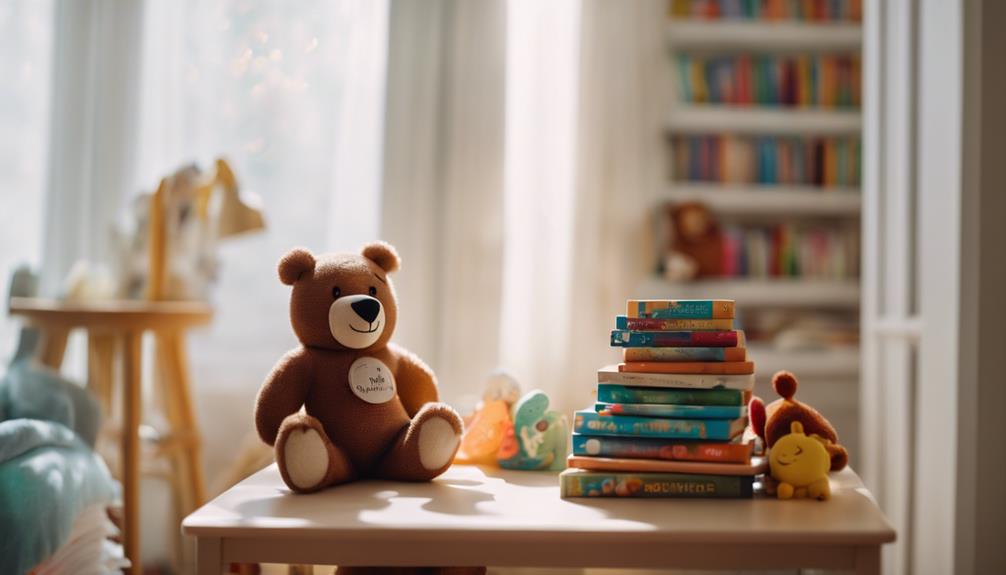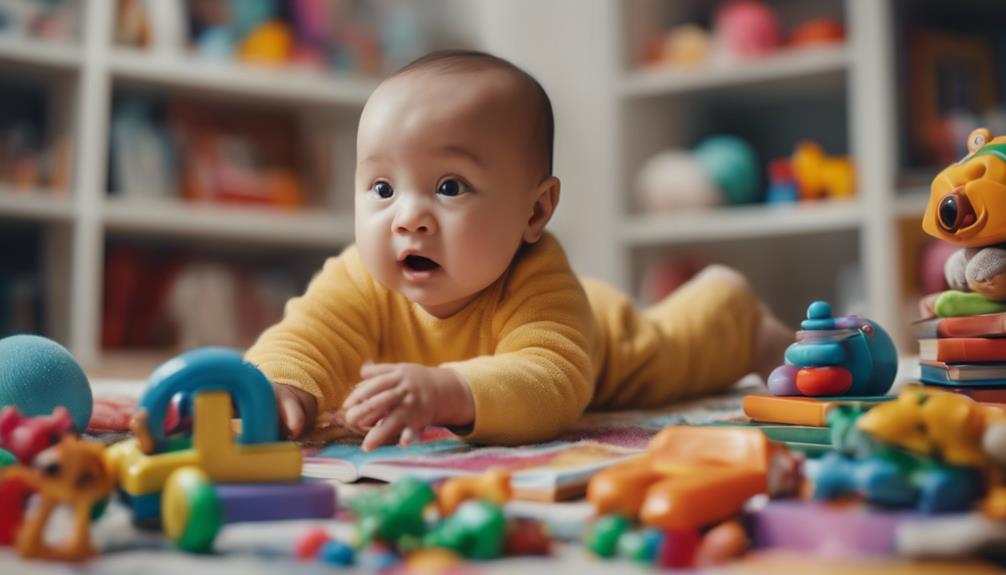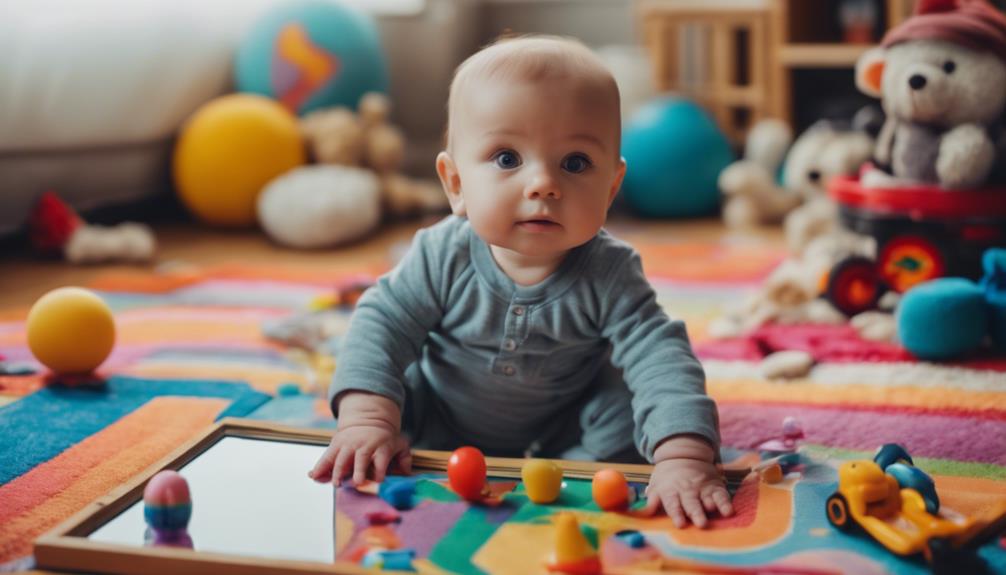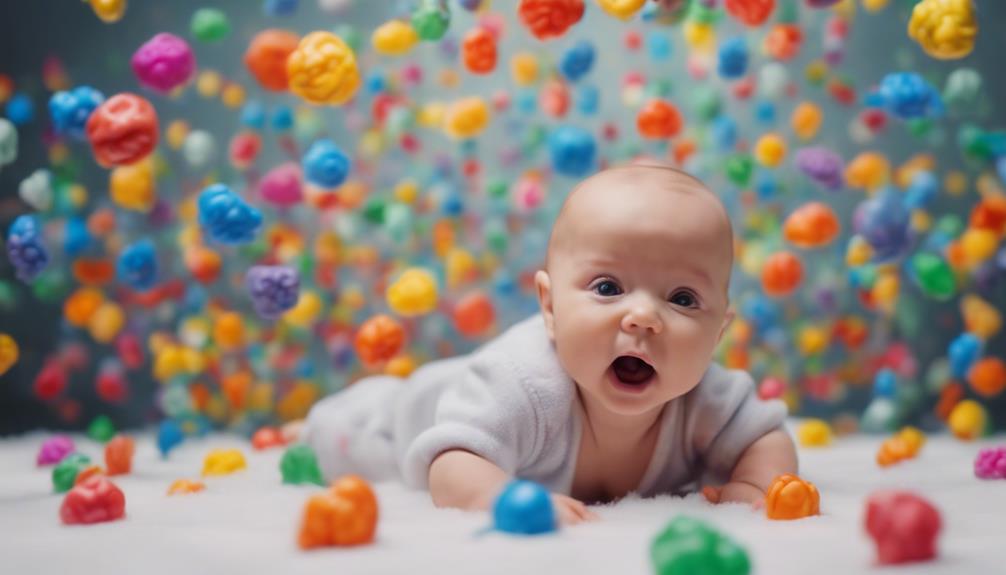Understanding the importance of early brain development is crucial for laying the foundation your baby’s future success. The early years are a time of rapid brain growth, mostly occurring before kindergarten. Your child’s experiences during this period are crucial in forming vital neural connections that impact cognitive, emotional, and social development. Caregiver interactions are essential in shaping the brain through responsive and nurturing environments. Prioritizing positive relationships and engaging activities during these formative years is essential for optimal brain development. Every interaction plays a role in creating a solid base for future learning and growth. More insights are yet to be discovered on how early experiences influence cognitive functions.
Key Takeaways
- Early experiences shape rapid brain growth in infants.
- Caregiver interactions wire essential neural connections.
- Positive social interactions aid emotional regulation development.
- Stimulating activities spark cognitive and sensory development.
- Quality early experiences lay foundation for future cognitive skills.
Importance of Early Brain Development
Understanding the significance of early brain development is vital for setting the foundation for a child's future well-being and success. During the first years of life, the brain undergoes rapid growth, with 90% of this development occurring before kindergarten.
Early experiences play an essential role in shaping neural connections, with millions forming during this critical period. Caregivers, through responsive interactions and positive relationships, play a pivotal role in wiring a child's brain for success.
Providing quality care, stimulation, and nurturing environments are essential for building strong neural connections that support cognitive, emotional, and social development. These early interactions have a profound impact on a child's future, influencing their ability to thrive and succeed.
Key Factors for Brain Growth
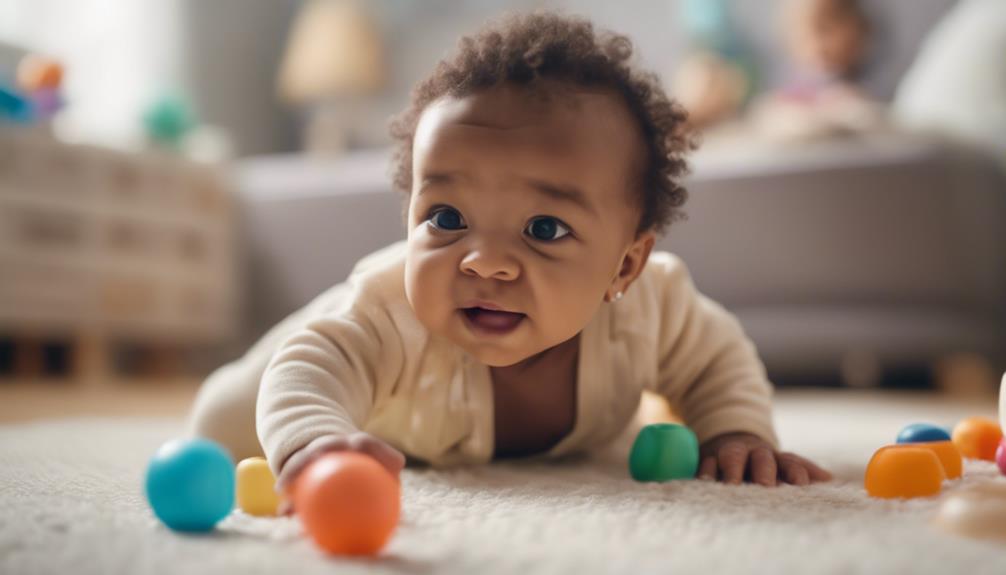
Early childhood experiences and interactions play an important role in shaping the key factors for brain growth in infants and young children. During the first year of life, the brain undergoes rapid development, doubling in size and forming an extensive network of synapses, which are connections between neurons.
These synapses are essential for learning and cognitive development, with babies creating up to twice as many as adults. As children grow, surplus synapses are gradually pruned, refining the brain's neural circuitry and optimizing its efficiency.
The quality of early experiences, such as interactions with caregivers and the surrounding community, greatly influences brain development and has long-lasting effects on a child's well-being. Parents, caregivers, and the broader community play essential roles in providing a nurturing environment that supports healthy brain growth and fosters future achievements.
Understanding these key factors is crucial for promoting optimal brain development during the critical early years of life.
Impact of Early Experiences
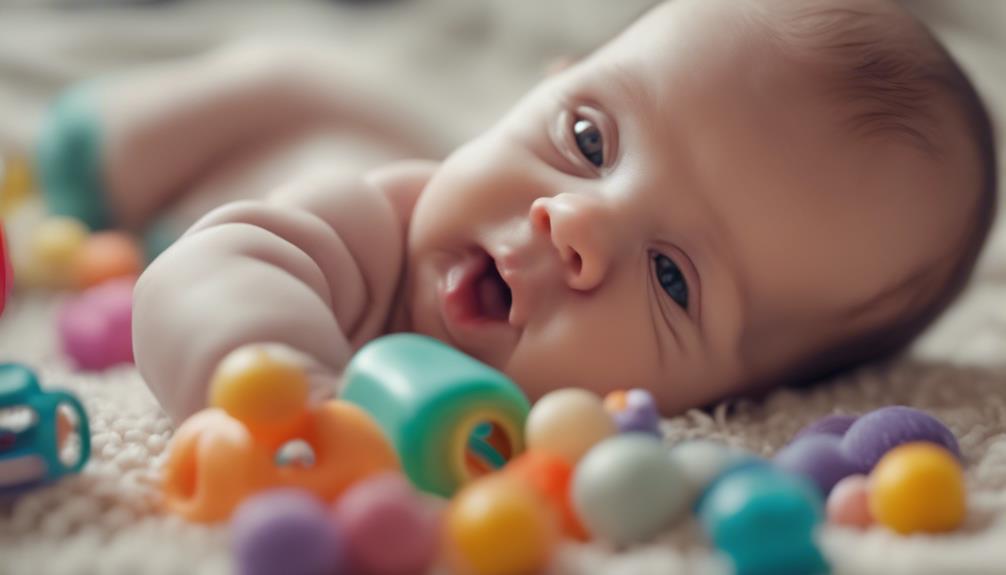
Early experiences play a vital role in shaping your brain development, influencing your well-being for years to come.
Positive interactions during these formative years are key to raising healthy, successful individuals.
Conversely, negative experiences such as poverty or family violence can have lasting detrimental effects on your long-term success.
Critical Early Interactions
During the essential period of baby brain development, the impact of early interactions plays a pivotal role in shaping neural pathways and cognitive abilities. Childhood experiences, particularly quality early learning and regular interaction with parents and caregivers, greatly influence the developing brain. Connections formed during these early years have a profound impact on future learning capabilities.
The brain's remarkable ability to adapt and grow is evident in the way it responds to external stimuli, forming synapses that enhance cognitive functions based on experiences.
Parents and caregivers are instrumental in providing a nurturing environment that fosters healthy brain development. Through positive interactions, children's brains are sculpted, with surplus synapses being gradually pruned to optimize neural efficiency. This delicate balance between genetic predisposition and environmental input highlights the importance of early childhood experiences in shaping brain architecture.
Formative Experiences Matter
Formative experiences profoundly impact the development of the brain in early childhood, shaping neural connections and cognitive abilities essential for future learning.
Early interactions play a significant role in brain organization, as demonstrated by the process of synapse elimination based on experiences throughout childhood.
Neural activity, driven by environmental input, enhances synapse strength, connectivity, and cognitive abilities, underscoring the significance of formative experiences in shaping brain development.
The surplus synapses present in early years highlight the brain's plasticity, allowing for adaptation based on early experiences and interactions.
Caregivers, including parents and communities, play an important role in influencing children's development by providing the necessary input for optimal brain construction and development.
Lasting Effects Observed
Understanding the lasting impact of early experiences on brain development is essential for promoting long-term well-being and cognitive growth in children. During the formative years, the brain exhibits remarkable plasticity, with excess synapses enabling responsiveness to environmental input.
Neural activity spurred by interactions with caregivers and exposure to stimuli refines synapse strength, enhancing connectivity and cognitive abilities. These early interactions shape the foundation for future learning and behavior, influencing a child's overall development trajectory.
The supportive role of parents, caregivers, and communities in providing enriching environments can't be overstated, as they play a pivotal role in fostering excellent brain development in children. By recognizing the significance of these early years in molding neural circuits and cognitive functions, we can prioritize creating nurturing environments that maximize the potential for positive outcomes in children's lives.
The enduring effects of early experiences underscore the importance of investing in quality interactions and environments to set the stage for lifelong well-being and cognitive flourishing in young minds.
Trauma and Brain Development

Addressing trauma in early development is vital for promoting healthy brain development and long-term well-being. Trauma experienced during childhood can greatly impact brain development, potentially leading to attention issues, learning disabilities, and other developmental concerns.
Adverse childhood experiences such as poverty and family violence can have lasting effects on a child's brain, influencing their long-term success. It's essential for caregivers and providers to undergo trauma-informed training to better understand and address the effects of trauma on brain development.
By supporting families and children who've experienced trauma, we can create a nurturing environment that fosters healthy brain growth and development. Recognizing the impact of early trauma and providing appropriate interventions can help mitigate its effects, allowing children to reach their full potential and lead fulfilling lives.
Through education, understanding, and support, we can help mitigate the negative impacts of trauma on early brain development.
Promoting Brain Growth

To promote healthy brain growth in young children, it is vital to prioritize positive relationships and responsive interactions with caregivers. During early childhood, the child's brain development is rapidly evolving, with neural connections being formed at a remarkable pace. This critical period lays the foundation for healthy brain growth, impacting essential functions like movement, cognition, and communication. Stimulating activities and engaging experiences play a significant role in shaping these neural connections, setting the stage for future learning and development.
| Key Factors for Promoting Brain Growth |
|---|
| Positive relationships with caregivers |
| Responsive interactions |
| Stimulation and engaging experiences |
| Early childhood development |
| Formation of neural connections |
Role of Experience in Development
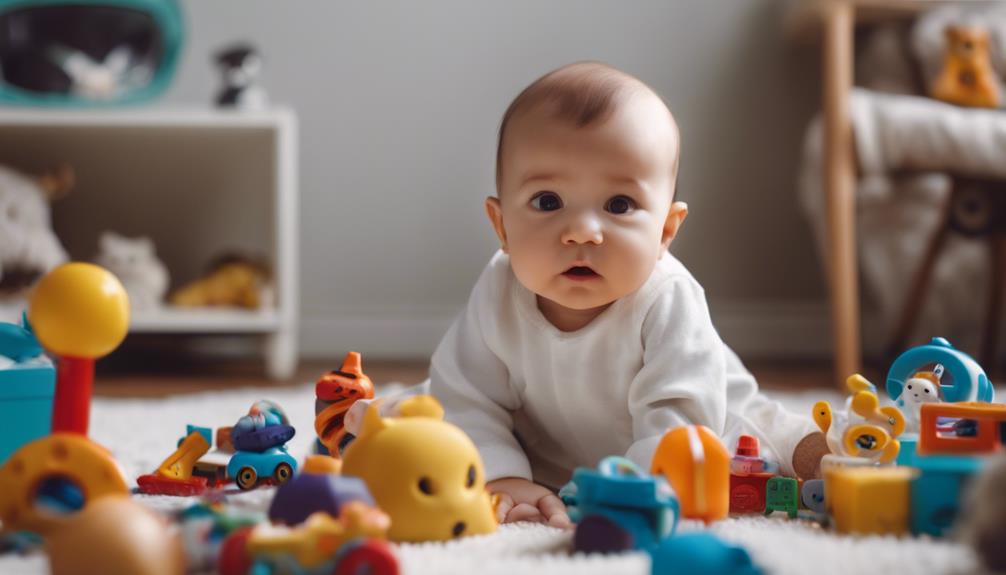
Experiences play a vital role in shaping your baby's brain development. Early sensory input, such as touch, talk, sight, and sound, impacts the formation of millions of brain connections.
Social interactions and cognitive stimulation in the first five years are key factors that influence your child's learning and behavior.
Early Sensory Input
Early sensory input plays a vital role in shaping your baby's brain development, impacting their cognitive abilities and neural connections. Sensory experiences, such as touch, sound, and sight, are essential for building healthy brain development. Interactions with caregivers provide babies with the stimuli needed to form strong neural pathways and enhance their learning capabilities. Positive early experiences help babies make sense of the world around them and lay the foundation for future cognitive skills.
To illustrate the importance of early sensory input, consider the following table:
| Sensory Input | Importance | Examples |
|---|---|---|
| Touch | Helps with bonding and emotional development | Cuddling, gentle massages |
| Sound | Stimulates brain activity and language skills development | Talking, singing, music |
| Sight | Aids in visual processing and recognition skills | Looking at faces, colorful toys |
Social Interaction Impact
Positive social interactions during early childhood profoundly influence brain development by fostering the formation of millions of synapses. Engaging in meaningful social exchanges with caregivers plays a pivotal role in shaping a child's neural pathways and cognitive abilities. Responsive and nurturing relationships wire the brain for healthy emotional regulation and social skills, laying the groundwork for successful interactions in the future. Quality social interactions also establish the foundation for language development and communication skills, enabling children to express their thoughts and emotions effectively.
The early experiences with responsive adults are essential in shaping a child's view of the world and fostering resilience. These interactions not only contribute to emotional well-being but also play a significant role in cognitive development. By creating a supportive environment through positive social engagement, caregivers help children build the necessary skills and confidence to navigate the complexities of social relationships and enhance their overall development during early childhood.
Cognitive Stimulation Effects
Engaging in stimulating interactions with caregivers plays a crucial role in shaping a baby's cognitive development and neural connections. Through cognitive stimulation, such as responsive caregiving and enriching experiences, infants form stronger neural connections and enhance their cognitive skills. Early exposure to language, music, and play interactions provides essential cognitive stimulation for babies. These experiences not only spark neural development but also contribute to long-term cognitive growth.
Here is a table summarizing the key factors in cognitive stimulation effects:
| Cognitive Stimulation Factors | Key Role |
|---|---|
| Responsive Caregiving | Shapes neural connections |
| Language Exposure | Enhances cognitive skills |
| Music Exposure | Stimulates brain development |
| Play Interactions | Fosters cognitive growth |
| Sensory Experiences | Strengthens neural pathways |
Brain Development Stages
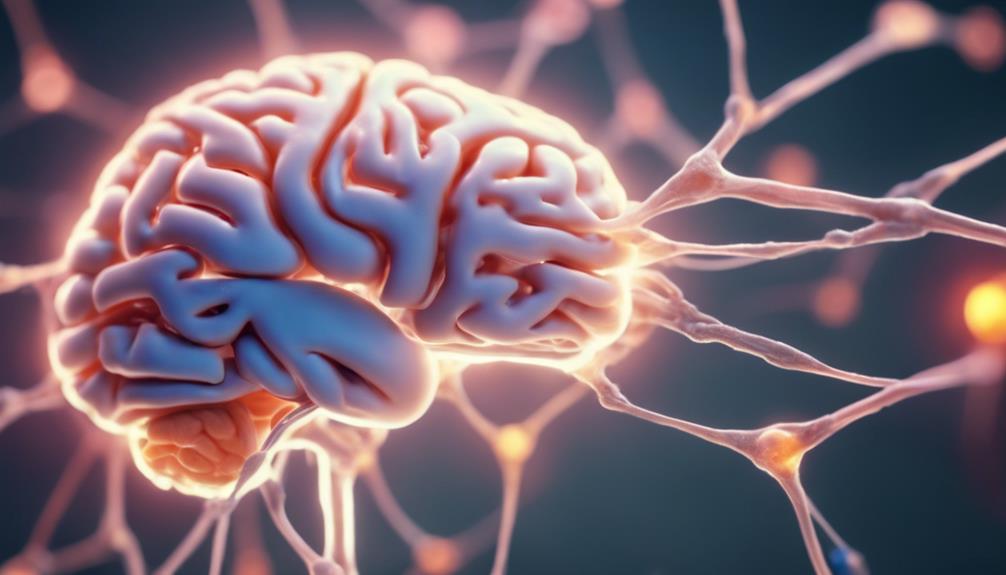
As brain development progresses, it undergoes distinct stages that play a pivotal role in shaping cognitive abilities and functions throughout life. These stages include:
- Neuronal Differentiation: During early development, brain cells differentiate into mature neurons or undergo apoptosis, vital for brain architecture.
- Synaptogenesis: This process involves the formation of synapses between brain cells, essential for information processing and cognitive functions.
- Myelination: Wrapping axons in fatty cells enhances communication efficiency in the brain, aiding in the transmission of signals.
- Genetic and Environmental Influences: Understanding the impact of genetics and experiences helps shape brain development in early stages, influencing how cognitive abilities develop over time.
These stages, from early development through postnatal phases, illustrate the intricate processes that occur in the brain to lay the foundation for cognitive functions and overall brain health.
Frequently Asked Questions
Does 90% of Brain Growth Happen Before Kindergarten?
Yes, 90% of brain growth happens before kindergarten. Your child's brain doubles in size within the first year, reaching 80% of adult size by age 3. Early childhood is vital for forming neural connections that shape future learning and behavior.
How Do I Know My Baby's Brain Is Developing?
You notice the signs daily – the smiles, the babbling, the curious eyes. Your baby's brain is developing beautifully. Engage in responsive interactions, track milestones, and seek guidance when needed. Trust your instincts; you're doing great.
At What Stage Does Baby Brain Development Start?
Baby brain development starts around 2 weeks after conception when the neural tube forms. Neurons multiply rapidly, laying the foundation during the first trimester. By the third trimester, significant growth occurs, shaping the brain's structures.
What Is the Most Critical Time for Brain Development?
You might think it's when you're older, but surprise! The most critical time for brain development is in those early years. By age 3, your brain is already 80% of its adult size, growing fast and shaping your future.
Conclusion
In summary, early brain development is vital for setting the foundation for a child's future growth and learning.
For example, studies have shown that children who are exposed to a rich environment with positive experiences and interactions tend to have better cognitive abilities later in life.
By understanding the key factors that contribute to brain growth, we can help support and nurture the development of young minds, ensuring they've the best possible start in life.


